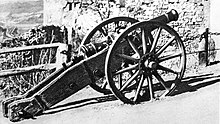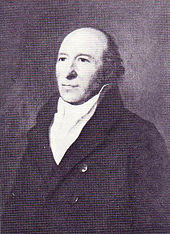Georg Christian Carl Henschel
Georg Christian Carl Henschel (born April 24, 1759 in Gießen ; † June 2, 1835 in Kassel ) was a German entrepreneur and co-founder of the Henschel & Sohn foundry , which later became Henschel-Werke.
biography

Henschel grew up in Gießen and learned the foundry trade from his father. In 1777 he came to Kassel as a journeyman and found work with the piece and gunmaker Johann Friedrich Anton Storck. After only three years as a journeyman, he became a partner in the foundry that Storck operated as a civil servant on a private account.
In 1780 he married the daughter of his principal Christine Wilhelmine Storck, who taught him writing, reading and arithmetic. In 1799 the first fire engine was sold by Storck and Henschel to Zittau . Landgrave Wilhelm IX. In 1795, Henschel transferred the "vacant piece caster against the free apartment in the local foundry and use of the adjacent garden". In 1796 a lead rolling mill was built based on Henschel's designs , which produced a semi-finished product for lead pipe production. In addition, in 1796 he became the manorial fountain manager and was responsible for the water supply in Kassel. In 1799 he acquired the so-called "Freyhaus" to expand the foundry and workshops, which together with the foundry formed a closed building complex. In 1802 the tenth child of the Henschel couple was born. As a princely court founder, Henschel was in the public service. He mainly dealt with gun and bell casting .
Napoleon's troops occupied the Electorate of Hesse in 1807 and Kassel became the capital of the Kingdom of Westphalia . Henschel cast cannon barrels for the occupiers. After disputes with the French city commander, Artillery General Alix, about the prices for the cannon barrels, he left the foundry on June 28, 1810 and moved to the neighboring, randomly empty "Freyhaus", where he ran the Henschel foundry with his second son Johann Werner Henschel & Son founded.
In 1817 his eldest son Carl Anton Henschel joined the company. Henschel & Sohn applied for the extension of the production privilege and also the authorization to sell its products exclusively. Henschel was unable to transfer the change that was triggered by the industrial revolution and that was marked by the transition from workshop production to mass production to his company.
He died in Kassel in 1835, three years after the death of his wife. The company was continued by Carl Anton Henschel. His second son, Johann Werner Henschel , who was originally supposed to take over the company, turned to sculpture.
Honors
- The Georg-Henschel-Straße in Bremen, Neustadt ports was named after him.
literature
- Carl-Friedrich Baumann: 175 years of Henschel . Steiger Verlag, 1985, pp. 11-14
- Kurt Ewald: Henschel, Georg Christian Carl. In: New German Biography (NDB). Volume 8, Duncker & Humblot, Berlin 1969, ISBN 3-428-00189-3 , pp. 554 f. ( Digitized version ).
- Franz Maria Feldhaus : Henschel, Anton . In: Allgemeine Deutsche Biographie (ADB). Volume 50, Duncker & Humblot, Leipzig 1905, pp. 568-572.
| personal data | |
|---|---|
| SURNAME | Henschel, Georg Christian Carl |
| BRIEF DESCRIPTION | German entrepreneur, founder of the Henschel works |
| DATE OF BIRTH | April 24, 1759 |
| PLACE OF BIRTH | to water |
| DATE OF DEATH | June 2, 1835 |
| Place of death | kassel |
